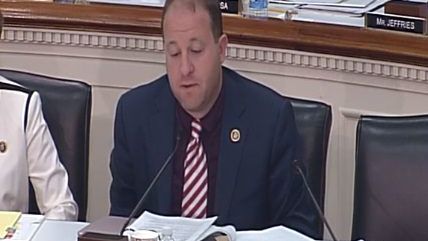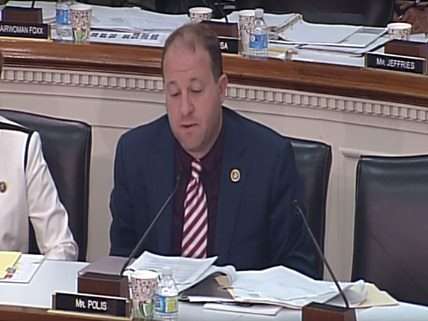Rep. Jared Polis Thinks Colleges Should Be Able to Expel Students When They're Only 20% Sure a Rape Happened
In a follow-up interview with Reason, Polis explains why he wants to let colleges expel innocent men.


Forget preponderance of evidence—Rep. Jared Polis (D-Colorado) wonders why campus rape adjudicators don't use an even lower standard of proof and expel students in cases where there is only a 20 percent chance that they are guilty.
Polis made this shocking remark during a House Subcommittee on Higher Education and Workforce Training hearing on campus sexual assault prevention Thursday morning. The hearing featured a Q and A session between lawmakers and campus rape experts—most of whom were dismissive of concerns that the campus adjudication process was unfriendly to the due process rights of accused students (the exception being Foundation for Individual Rights lawyer Joseph Cohn).
Toward the end of the hearing, several panelists noted that they preferred the "preponderance of evidence" standard, which holds that a student should be found guilty of sexual assault if adjudicators decide it is more likely than not he committed the crime. This standard is "the most equitable" one, they said: it establishes identical burdens for accusers and the accused.
I could go into all the ways this idea is wrong and flies in the face of liberal Western notions about justice and fairness—whatever happened to innocent until proven guilty? Not equitable, alas—but it's actually a downright reasonable position, considering what Polis advocated moments later. He said:
"It certainly seems reasonable that a school for its own purposes might want to use a preponderance of evidence standard, or even a lower standard. Perhaps a likelihood standard…. If I was running a (private college) I might say, well, even if there is only a 20 or 30 percent chance that it happened, I would want to remove this individual."
Cohn responded that a burden of proof standard even lower than the preponderance of evidence standard would unquestionably violate students' due process rights. The preponderance of evidence standard is itself an abridgment of due process unless it is accompanied by balancing factors such as cross-examination, subpoena power, and competent judges and juries, according to Cohn.
Astonishingly, Polis continued down this line of thought:
It seems like we ought to provide more of a legal framework, then, that allows a reasonable likelihood standard or a preponderance of evidence standard. If there are 10 people who have been accused, and under a reasonable likelihood standard maybe one or two did it, it seems better to get rid of all 10 people. We're not talking about depriving them of life or liberty, we're talking about them being transferred to another university, for crying out loud."
(Emphasis mine.) That last line drew applause from the crowd.
I emailed Polis some follow-up questions, and he graciously answered them.
"We aren't talking about depriving someone of their liberty here, we're talking about the ability of an institution to decide who can pay them to enroll in their courses," he wrote in an email to Reason. "I associate "due process" with a conviction of criminal penalty; what affirmative right do I have to pay a university and make them deliver courses to me? They deny students the ability to enroll for all sorts of reasons."
But what if Polis's own son was among a pool of students accused of sexual assault? Would Polis really want his student expelled under such a jarringly low standard?
"If my son had a baseless accusation made against him at a university and it was making his life there miserable, I would suggest he transfer or take courses online," wrote Polis. "It can be a living hell to go through endless campus investigations. I've seen this go down, and there really is no winning once the accusation is made even if the process provides formal vindication. Someone who is wrongfully accused needs to do their best to put it behind them and move on. Trying to re-enroll in the same institution would be a constant reminder of the traumatic experience of being the subject of a baseless accusation.
If a university were to implement a 'reasonable likelihood' standard, it is important that they give the student the ability to withdraw so that their record isn't tainted, nor should a mere reasonable likelihood standard hurt their prospects elsewhere."
I then asserted that this arrangement cedes way, way, way too much power to accusers (yes, I wrote way three times):
"I think these matters should be up to Universities to decide," he replied. "University of Colorado (CU) has an elected board of Regents. They should decide if they want to have a reasonable likelihood or preponderance of the evidence standard. If a University errs too far on the side of giving 'way, way, way too much power to accusers' then that will hurt their competitive standing in the marketplace. There is room for all sorts of standards in the marketplace and prospective students will choose the right balance based on their preferences and the reputations of the various universities."
Watch Polis's comments at the hearing, beginning 1 hour and 56 minutes in, below.


Show Comments (383)